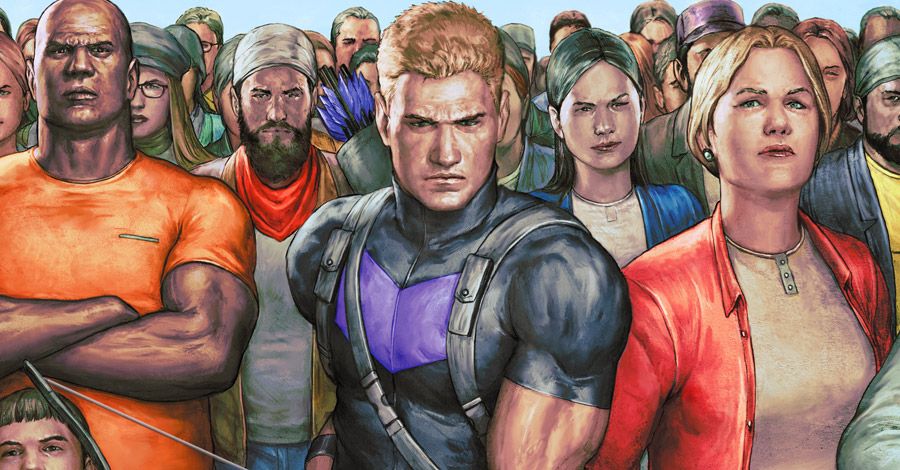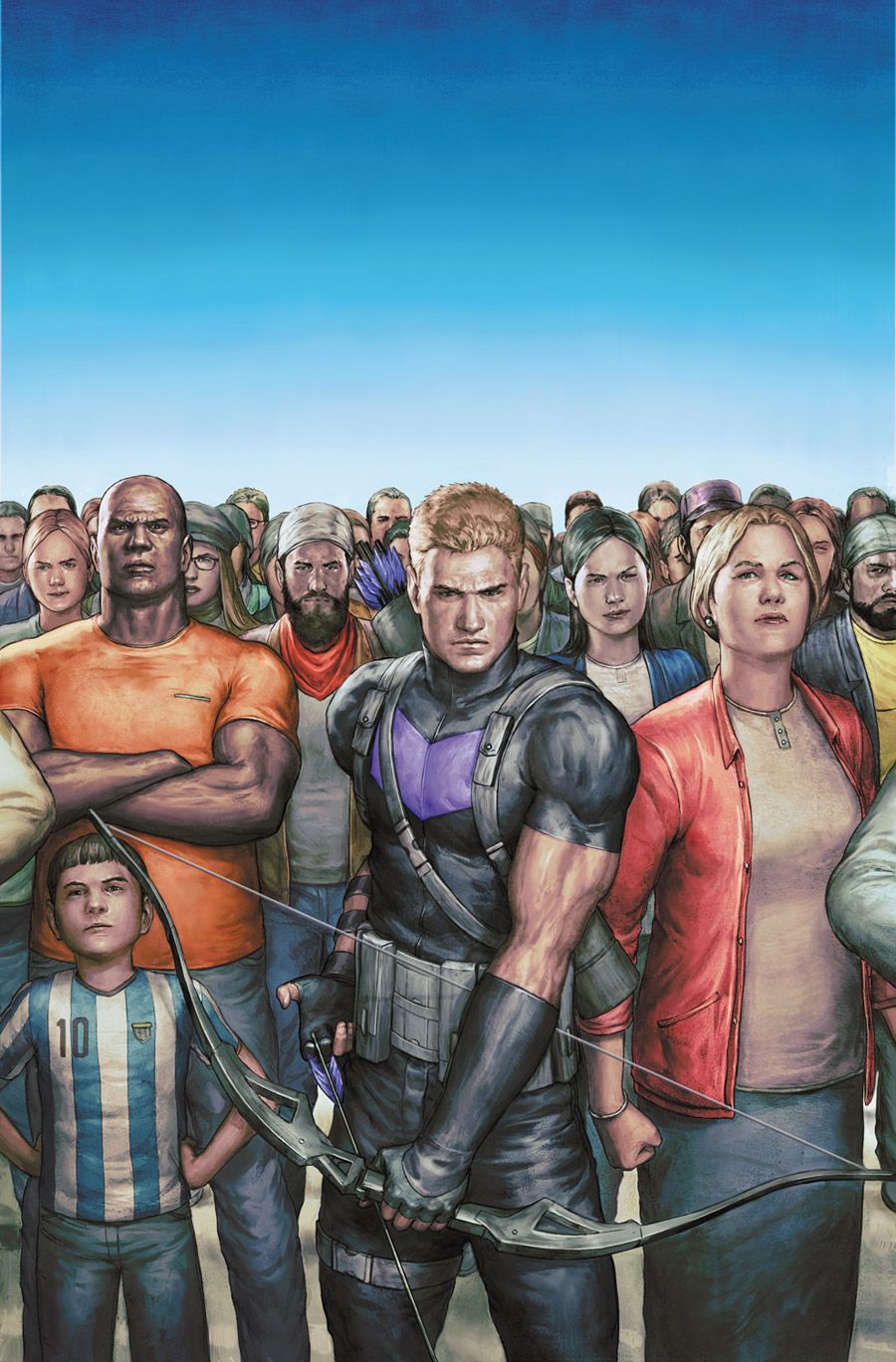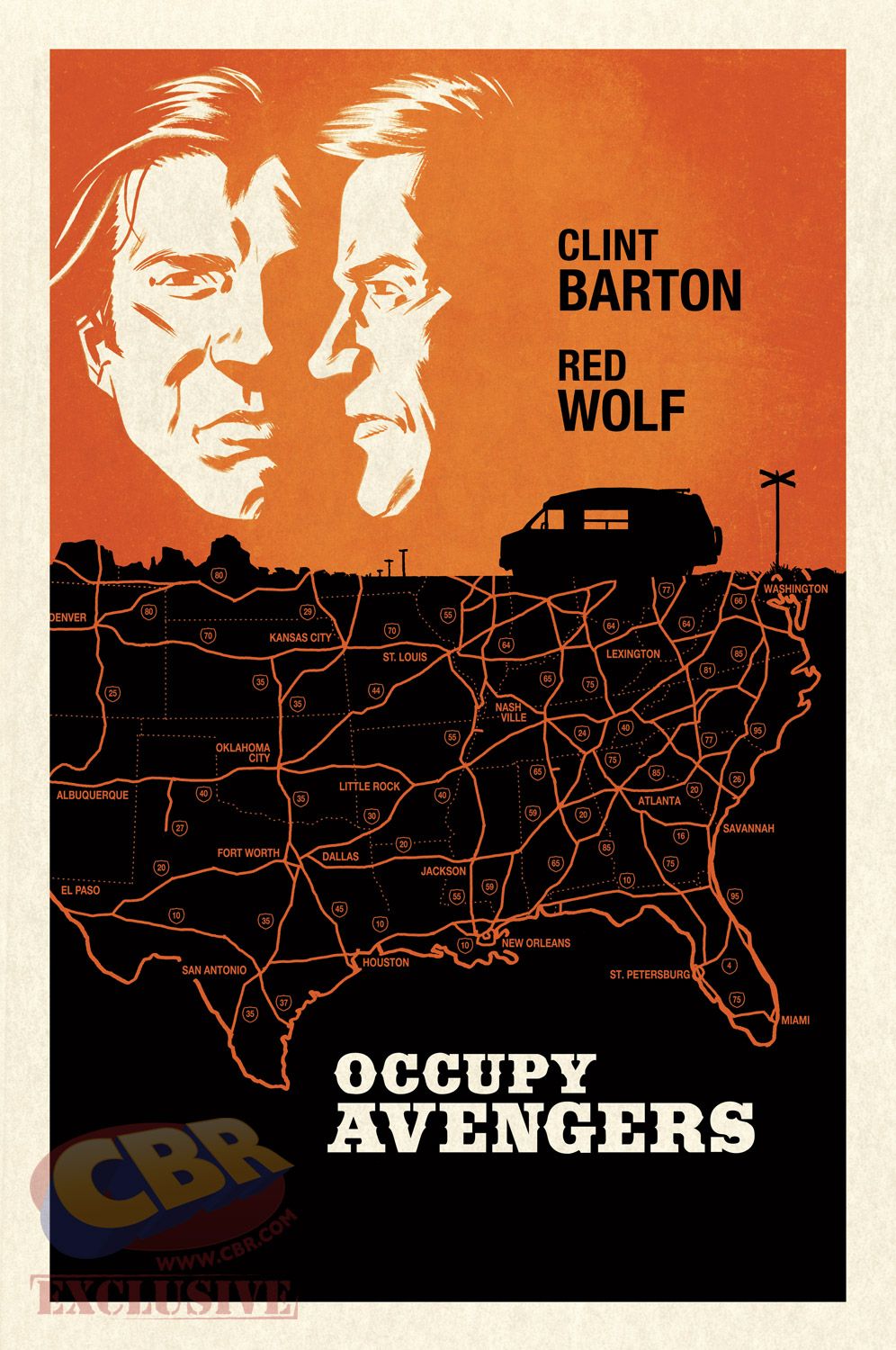When a world's costumed champions have their eyes on the bigger picture, the plight of the average citizen can be overlooked. In October, Avengers veteran Hawkeye hopes to change that as he sets out on a cross-country journey to battle the injustices and problems faced by everyday people.
While he does that he'll also wrestle with lingering guilt over his role in the death of Bruce Banner in Marvel Comics' "Civil War II." It's a daunting task, but Clint Barton won't have to tackle it alone. He'll be backed up by an entire team of heroes that's also looking to make a difference while coming to terms with personal demons.
RELATED: A Classic Marvel Hero Dies By Another's Hand, As "Civil War II" Gets Complicated
The adventures of Hawkeye and his hard traveling heroes will be chronicled in "Occupy Avengers" by writer David F. Walker and artists Carlos Pacheco, who kicks the series off with Issues #1-4, and Gabriel Hernandez Walta, who joins the series with Issue #5 following the finale of his and Tom King's "Vision."
CBR spoke with Walker about the new series.
CBR: The title "Occupy Avengers" suggests you'll be dealing with a team of heroes interested in some more down-to-earth problems.
David Walker: This is a post-"Civil War II" book. Most people at this point know what Clint Barton did in that event, in terms of the fate of Bruce Banner and the Hulk. This book takes place after all of that, and Clint is in this sort of weird existential malaise. Within the hero community, he's seen as someone who's betrayed the cause, and with everyday people, he's like the ultimate hero. He's David who slew Goliath.
He's not only trying to atone for what he's done and make sense of it, he's also out there trying to make sense of where he fits in. In the process he keeps running into everyday people who have real-life problems -- the sort of problems that the Avengers don't normally get involved with. He begins to form a team that's tackling what we'd call, for lack of a better term, everyday issues.
I use that term hesitantly because sometimes everyday issues are critical life-and-death issues. You live in Michigan, and I was just reading about the court decision in the Flint water fiasco. That should not be an everyday issue. Those are the sorts of things that Hawkeye -- or Clint Barton, I should say, because he's really more Clint than Hawkeye at this point -- finds himself getting caught up in. He's representing and protecting the underdog. Or, for lack of a better term, that 99 percentile that is sort of synonymous with the Occupy movement; the people who are often trod upon, can't protect themselves, and don't feel like they're being protected because of things like corporate interests or political corruption.
Is this series going to be taking some cues and inspiration from the recent "Hawkeye" series, then?
There are definitely some similarities, but I want to be really careful to not trod upon anything that Matt Fraction did, because that was such an amazing book. One of the things we're doing with "Occupy Avengers" is, rather than having everything centered around Clint's apartment building and his neighbors, he's on the road. He's traveling across America.
When you add superheroes, who engage in direct action, to complex social problems that involve listening and evaluating options, sometimes unintended consequences result. Is that something we'll see in "Occupy Avengers?"
Yeah. We're sort of tackling things in comic book form, meaning we have a limited amount of real estate and a limited amount of panels and pages to tell stories. You can't fix a real-life problem in 20 pages. A lot of it is broad strokes, and a lot of it is sort of wish fulfillment for the readers. Because that's what I think a lot of superhero comic books are all about; trying to find wish fulfillment, trying to find justice or equality when we're not getting it in our everyday lives. That's where the escapism part of it is.
It's been an interesting challenge as a writer, because I'm looking at some of the issues that this team is going to be wrestling with, and a lot of them are very similar to the issues that we're wrestling with in everyday life, but there are no simple answers.
It's interesting to me because I remember the shock that I felt during 9-11 when the plane hit the first tower. Then the second plane hit, and I was working at a newspaper at the time, so we were watching it all happen, trying to figure how to report on what seemed like the end of the world. I remember one of my co-workers saying, "I just keep expecting Superman to show up and save the day." This is almost 15 years ago now, and I remember thinking, "That's how much superheroes and the solutions they provide have ingrained themselves in our thought processes." When real-life tragedy strikes, we're actually surprised that Spider-Man and the Avengers don't show up.
In real life that doesn't happen. So it's been an interesting challenge to write a book where the superheroes can show up and save the day, but trying to keep it more grounded in reality in that they're not always successful.
There are no super-powered beings on the "Occupy Avengers" team. They are highly skilled and highly dedicated people, but there are no gods, goddesses, mutants, Inhumans or anything like that on the team. So that also plays into the  Occupy movement which was about everyday people. It's the 99 percent who aren't rich, who can't buy they're way out of some of the problems that they have. America is often a country that's built upon ingenuity and necessity. Those concepts are often dictated by the poorest and most oppressed people.
That's how people become skilled. That's how people invent some of the most important inventions of the last two or three centuries. That's part of what we're playing with as well.
This brings us to the revelation of the first member of Hawkeye's team: Red Wolf! How did he end up on your roster?
Red Wolf is an interesting character to play with. There have been different versions over the years, but this one is fairly new, so it has been interesting getting into what makes him tick. For readers that don't know Red Wolf, he's a Native American, who was transported through time from the 1800s to now. In his own time, he was a badass, fighting for justice; now he's a badass fighting for justice, but completely out of his element.
I drew a lot of inspiration from Captain America/Steve Rogers. I'm developing Red Wolf as this guy who has his smartphone with him at all times -- he's constantly looking things up, trying to learn about the world he stuck in. As with Clint, there's an aspect of Red Wolf that is lost, and looking to find his way. What is really going to be fun will be when the other team members start to show up.
What can you tell us about the lineup of the rest of your team? How diverse is your cast?
At this point there are no original characters in the lineup. We're playing with some interesting notions in that there's going to be a core team. That team consists of characters who are already established in the current Marvel Universe, and all of them are some of the last people we'd expect to see on a team like this. That's really fun to play with. Then as we're moving forward we're talking about having guest stars show up for a single issue or story.
So we've got Clint and then we've got characters A, B and C. We'll have the core team in place by, if not issue #3 issue #4. Issue #1 and #2 really establish Clint on a sort of mission and the fist member of this team. Then in issue #3 we bring in the remainder, and by issue #4 the team is in place.
Then, moving forward, we're looking at the Marvel Universe and all these interesting characters who don't necessarily have super powers, or maybe they have really limited super powers and asking how can we work them into a story? How can we get them into a two issue arc?
That's the other thing we're really trying to do, and it's proving to be a big challenge. We want it so that no story lasts more than two issues. As a kid growing up I was a big fan of books like "Marvel Two-In-One," "Marvel Spotlight" and "Marvel Premiere." The vast majority of those stories were told in either one or two issues, and I love the concept of a book that readers can jump into and they don't necessarily have to jump in right away.
We want to make sure that the team is diverse, because it's really easy to go one of two directions -- to have a team of nothing but the fallback white characters, or to just have diversity for the sake of diversity, but the team doesn't make sense. I'm not saying Misty Knight is someone I want to use, because she's not someone I want for the team, but it would be really easy to go, "We need a black woman on the team. Let's get Misty Knight." That's not what I'm trying to do.
The other thing I'm trying to do is find characters that, again, are like Hawkeye in that they don't have super powers, but also have pretty significant demons that they're wrestling with or pretty significant personal problems that they need to overcome. This is a book about a team of people that are either looking for a way to redeem themselves or trying to find their place in the world.
I'm trying to tap into is this universal feeling of feeling like you're alone, but you're not. That's part of what this team is about. It's like, "I'm going to help you get through this." It might sound corny or cliched, but this is going to be as much of a team as it is a really odd community of people who have decided to use their skills to make the world a better place.
I imagine another large part of the appeal of "Occupy Avengers" is the fact that the team is traveling the country, since it allows you a lot of freedom to develop other parts of the U.S. and villains that can be found there.
Yes, that gives us the opportunity to have both established villains in some capacity and the sort of Boss Hogs of the the world, [Laughs] to refer back to the "Dukes of Hazzard." When you watched TV shows like "The Fugitive," "Have Gun -- Will Travel" or "The A-Team," it was like there was always this little town somewhere in Iowa or something and the evil boss who runs the factory. I always go back to the character of Curley in "Of Mice and Men." He was the son of the guy who owned the farm that George and Lenny show up at, and he's sort of the bully. So there's going to be a lot of "Of Mice and Men" moments. [Laughs] Clint Barton and his ragtag team will show up and protect the rights of the workers or the local population from whatever scourge that is threatening them.
I also like the idea of in the Marvel Universe you have characters like the Kingpin, the Hood or several other New York crime lords, but who is the kingpin of Des Moines, Iowa? And what is he or she doing there that will lead the Occupy Avengers to try and clean up that town? It's pretty fun to think about that sort of stuff.
What can you tell us about the Occupy Avengers' connection to the rest of the Marvel Universe? Will the other Avengers teams be aware of and approve of their activities?
We're still figuring that out, but these are not the most sanctioned of Avengers. [Laughs] When the "Avengers Assemble!" call goes out they're tuned into a different channel. Part of what Clint is trying to get away from is that seemingly constant sort of battle within the superhero community. That's similar to something I've been addressing in "Power Man & Iron Fist." It's this idea of, "We're here to do good. We're not here to fight with each other."
At some point, the Occupy team will cross paths with other Avengers and there will be a sort of, "Hey, what are you guys doing?" It's going to take a little while though for what Clint and his team are doing to really show up on their radar. They're not dealing with Thanos, Ultron or a Skrull invasion. It's more like, someone dumped toxic waste into the water supply.
So, Clint and his team are more likely to come across heroes who focus on helping everyday people instead of saving the world.
Yeah, and that's the direction we're heading in "Power Man & Iron Fist," too. I think we're heading into an era where we want superheroes who inspire us on levels that are a little bit closer to home. Don't get me wrong -- I love reading great stories like "Planet Hulk" where he's off fighting as a gladiator on an alien world. There's also a lot to be said, though, about how our superheroes should be inspiring us in ways that are a little bit closer to home, and make us go, "I could do that." Not necessarily become proficient with a bow and arrow and go out and fight crime. [Laughs] More, "How do I make my community better?"
Note: This interview was edited for length.



